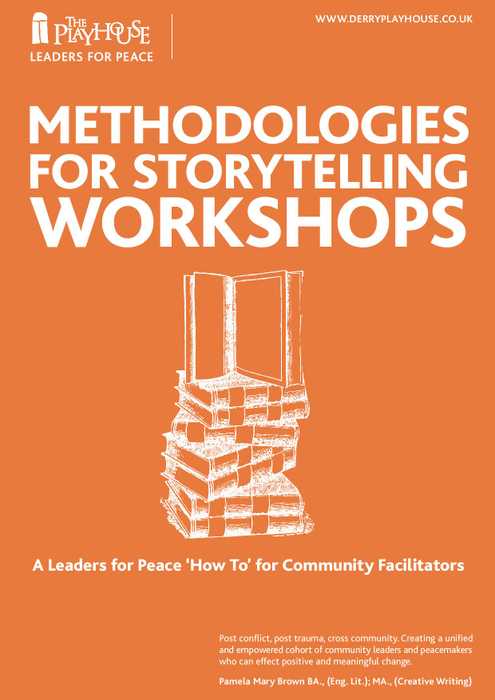The Playhouse
January 2021: Dr Liam Campbell and I began consultations concerning the project ‘A Storytelling Methodology’. This is the upskilling and training manual used by Theatre of Witness (TOW) and Theatre Peacebuilding Academy (TPA) for guiding participants in facilitating workshops that teach Leaders for Peace. Dr Liam Campbell and I devised the working title: ‘Storytelling Training Methodologies’ post conflict, post trauma, cross community. Creating a unified and empowered cohort of community leaders and peacemakers who can effect positive and meaningful change.
In reflecting on 30 years’ experience as a facilitator using resources that proved invaluable for facilitating storytelling workshops, I realised had through study and teaching amassed a wealth of resources. These resources enabled facilitating Outreach Programmes, working in Prisons, Community Groups, Health Forums, Cancer Awareness, Youth Groups, Literacy Programmes, Survivors of Domestic Abuse, the Travelling Community, Women’s’ Groups, Mental Health Agencies, Primary and Secondary Schools. I also designed the weekly resource for Prisoners in HMP Magilligan during the COVID-19 pandemic with the suspension of face-to-face teaching.
I decided the manual needed chronology that mirrored how a workshop was conducted. The introduction and the early sections/chapters became the ‘why’ of storytelling, lesson planning, using the manual, the role of the facilitator, the workshop space, the storytelling tasks, permission slips and the glossary. There was a narrative journey and a step-by-step process for workshops to achieve the outcomes. These aspects were extensively supported by the bibliography as well as the rich research and footnotes.
I updated the ‘Mindfulness’ section—and devised an initial workshop where a counsellor could be present to conduct sessions with a facilitator. I updated the sections on symbolism to include the NI context and addressed the need for a ‘safe space’ and ‘reliable and well sourced resources’ along with support systems and ‘preparation time’, and notice for ‘training sessions’ were highlighted with ‘integrity’ and ‘education’ as the repeated themes.
There was the necessity of demonstrating how your story has evolvedand repeating your model leading to being ‘boxed in and restricted.’ Participants reflecting changes in the storyteller was a key point. I worked towards engagement with the exercises in the manual to enable participants to ‘grow’ their story. Focus groups included TOW and TPA, highlighted the need for the chapters on Ethics and Ethical storytelling, co-facilitation and shadow-facilitation, as well as the use of ‘story’ as opposed to ‘testimony’.
The ongoing meetings and up-dates with Liam Campbell further extended into the selecting quotes from TPA and TOW for inclusion in the manual. Permissions were granted to add Dr Liam Campbell’s article on “Active Listening” and Dr Kevin Kiely’s academic article “Modernist and Post-Modern Storytelling”. Dr Kiely further granted permission to use his translation of a poem by Rilke as resource content, and otherwise he provided editorial feedback on the final draft of the manual.
The creation of the manual required extensive work, incorporating the multiple layers of individual and group reflections while achieving a balance of the variegated contents. It is ‘user friendly’ and achieves the essential requirements of being professional, complex, practical and theoretical, a guide for the storyteller to share their narrative while growing in the process of sharing, as well as demonstrating that meta-narratives belong to the broader story of growth, healing and understanding.
As a concept, Dr Liam Campbell not only supported the ‘progressive template’ but also compelled it forwards through his belief and dedication to Peacebuilding. It is with profound sadness that his passing on the 20 December 2021 closed off the year of intense work. Dr Campbell, of course, leaves an unquestionable legacy, he leaves this ‘model’ for which we owe him a huge debt of gratitude.
